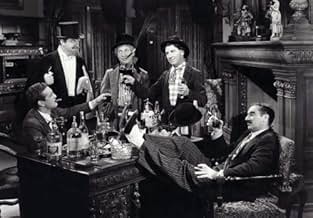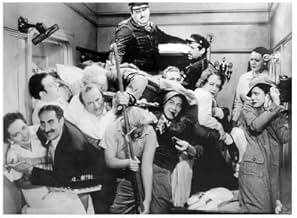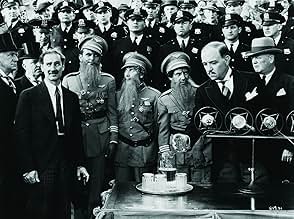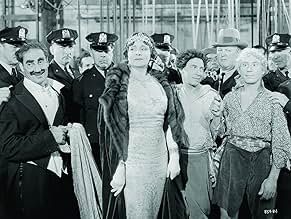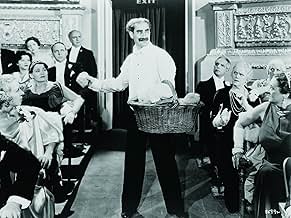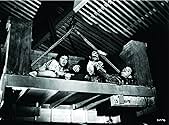A sly business manager and the wacky friends of two opera singers in Italy help them achieve success in America while humiliating their stuffy and snobbish enemies.A sly business manager and the wacky friends of two opera singers in Italy help them achieve success in America while humiliating their stuffy and snobbish enemies.A sly business manager and the wacky friends of two opera singers in Italy help them achieve success in America while humiliating their stuffy and snobbish enemies.
- Awards
- 3 wins total
Walter Woolf King
- Rudolfo Lassparri
- (as Walter King)
Sig Ruman
- Herman Gottlieb
- (as Siegfried Rumann)
Robert Emmett O'Connor
- Police Sergeant Henderson
- (as Robert Emmet O'Connor)
Enrique Acosta
- Nightclub Guest
- (uncredited)
Harry Adams
- Opera Spectator
- (uncredited)
Harry Allen
- Doorman
- (uncredited)
Sam Appel
- Dungeon Guard
- (uncredited)
King Baggot
- Dignitary
- (uncredited)
Marion Bell
- Lady looking for 'Aunt Minnie'
- (uncredited)
Edna Bennett
- Maid
- (uncredited)
Summary
Reviewers say 'A Night at the Opera' is celebrated for its iconic comedic routines and the Marx Brothers' unique blend of verbal and physical comedy. Groucho's wit, Chico's musical talents, and Harpo's slapstick humor are highlighted. Margaret Dumont's role and musical numbers add entertainment value, though some criticize their integration. The film is praised for its production quality and subversion of high society norms. However, a perceived shift towards more structured comedy marks the beginning of a decline in their later works.
Featured reviews
This is probably the best Marx Brothers film. It is certainly my favorite. The brothers destroy pomposity and pretension by the ton. The pieces of comic business were worked out through many live theater performances before the scenes were finally filmed. This craftsmanship never shows, but it pays off completely. The stateroom scene is a classic, and the total devastation of the opera is a delicious piece of craziness.
No doubt that "A Night at the Opera" is right up there with "Duck Soup" as the best Marx Brothers movie. Some Marx-purists complain "ANatO" is when the brothers started to grow soft and their quality started to decline. For one thing, instead of ridiculing romantic couples (the love story subplot plays a big part), they support them. Also, it's not as surreal or satirical as their past films. To those purists, I say: Lighten up! "ANatO" is just as funny as anything the Marx Bros did in the past (heck, I think it's funnier than "Monkey Business"), and it's withstood the test of time perfectly. In fact, "ANatO" is said to be Groucho's favorite; he even called his previous films "duds"! The film is filled with jabs at the upper class and double entendres courtesy of Groucho. Sample:
Mrs. Claypool: Do you have everything, Otis?
Otis: I haven't had any complaints yet!
The love story subplot isn't as nauseating as 1937's "A Day at the Races". Allan Jones may be a bit too mushy, but Kitty Carlisle, the love interest, is cool and calm enough to help it go down easily (that's really her singing, by the way). Chico and Harpo have some inspired moments, such as their gleeful butchering of "Il Travotore" (sp?). The hapless villains are the funniest Marx foils ever, and the finale is just uproarious. "ANatO" is a wonderfully silly romp, and it's rather harmless, so kids can probably watch and enjoy it. The famous stateroom scene is nothing short of brilliant, and you'll find yourself humming along to "Cosi Cosa" (I just wish the ballad "Alone" had been left, well, alone). Don't miss this hilarious masterpiece. And now, on with the opera!!
Mrs. Claypool: Do you have everything, Otis?
Otis: I haven't had any complaints yet!
The love story subplot isn't as nauseating as 1937's "A Day at the Races". Allan Jones may be a bit too mushy, but Kitty Carlisle, the love interest, is cool and calm enough to help it go down easily (that's really her singing, by the way). Chico and Harpo have some inspired moments, such as their gleeful butchering of "Il Travotore" (sp?). The hapless villains are the funniest Marx foils ever, and the finale is just uproarious. "ANatO" is a wonderfully silly romp, and it's rather harmless, so kids can probably watch and enjoy it. The famous stateroom scene is nothing short of brilliant, and you'll find yourself humming along to "Cosi Cosa" (I just wish the ballad "Alone" had been left, well, alone). Don't miss this hilarious masterpiece. And now, on with the opera!!
I didn't fully appreciate this film until my second viewing. Now I think it's one of the better Marx Brothers film. The film - filled with funny lines - has all the familiar MB trappings: good slapstick, good and bad jokes and routines, wild scenes, several musical numbers and general overall chaos.
The only thing not appealing to me in the film were some of the songs - not all, just some. Otherwise, it was all fun as Groucho, Chico and Harpo all share humorous lines and/or sight gags. Kitty Carlisle doesn't offer much in the way of a young beauty but it was still interesting to see her at this age as I had only known her through her "To Tell The Truth" television days. Alan Jones, meanwhile, is a pleasing singer and a nice guy, as always.
This is the film with the famous scene involving a ton of people being stuffed into Groucho's small cabin room. It's more amazing than funny. My favorite scenes were when Groucho and Chico got into discussions and trade lines back-and- forth. I also laughed heartily at the finale with Harpo swinging like Tarzan at the opera house.
In all, a funny MB film, one of the boys' better efforts. I play it with the English subtitles so as not to miss any of the great lines of dialog in here.
The only thing not appealing to me in the film were some of the songs - not all, just some. Otherwise, it was all fun as Groucho, Chico and Harpo all share humorous lines and/or sight gags. Kitty Carlisle doesn't offer much in the way of a young beauty but it was still interesting to see her at this age as I had only known her through her "To Tell The Truth" television days. Alan Jones, meanwhile, is a pleasing singer and a nice guy, as always.
This is the film with the famous scene involving a ton of people being stuffed into Groucho's small cabin room. It's more amazing than funny. My favorite scenes were when Groucho and Chico got into discussions and trade lines back-and- forth. I also laughed heartily at the finale with Harpo swinging like Tarzan at the opera house.
In all, a funny MB film, one of the boys' better efforts. I play it with the English subtitles so as not to miss any of the great lines of dialog in here.
"A Night at the Opera" is one of those films you can see dozens of times and laugh just as hard as you did the first time. The brothers get mixed up with an opera company and a divo and diva in love - Allan Jones and Kitty Carlisle, and trying to get the two to perform together.
The one-liners come so fast - you keep thinking you'll remember them, but one is funnier than the next. I do remember what Groucho says when he sees the gypsy Azucena in the opera, however. "How would you like to feel how she looks?" The stateroom scene is, of course, a classic, and my favorite part is when Groucho tells the housekeeper, "I want two pillows on that bed" and Harpo sound asleep and being moved everywhere, including onto a tray of food.
But nothing beats the last half hour - the performance of "Il Trovatore" with Harpo using the stage ropes like Tarzan, and Chico playing baseball in the orchestra while Groucho sells peanuts. They have replaced part of the overture with "Take Me Out to the Ball Game."
Allan Jones plays the tenor Ricardo Baroni who is hoping for his break. Why they cast the blond Jones as a tenor named Baroni - well, there you go. He sings very well and is quite handsome. Kitty Carlisle is the diva waiting, petite and pretty and singing music out of her vocal type, with the exception of "Alone." "Stridono lassu" and Leonora in Trovatore were both much too heavy for her. She does sing well and what a woman - she's still alive and recently performed at a New York supper club recently at the age of 95.
The only problem with any Marx Brothers film is that when they aren't in front of the camera, suddenly their films become very slow. Because I was trained in opera and have some interest in it, this was less the case than with some of their other films. They were too magical, too energetic, and too darn funny to ever share a spotlight with anyone else. Thank goodness they did, though, as they left us with many treasures. This is one.
The one-liners come so fast - you keep thinking you'll remember them, but one is funnier than the next. I do remember what Groucho says when he sees the gypsy Azucena in the opera, however. "How would you like to feel how she looks?" The stateroom scene is, of course, a classic, and my favorite part is when Groucho tells the housekeeper, "I want two pillows on that bed" and Harpo sound asleep and being moved everywhere, including onto a tray of food.
But nothing beats the last half hour - the performance of "Il Trovatore" with Harpo using the stage ropes like Tarzan, and Chico playing baseball in the orchestra while Groucho sells peanuts. They have replaced part of the overture with "Take Me Out to the Ball Game."
Allan Jones plays the tenor Ricardo Baroni who is hoping for his break. Why they cast the blond Jones as a tenor named Baroni - well, there you go. He sings very well and is quite handsome. Kitty Carlisle is the diva waiting, petite and pretty and singing music out of her vocal type, with the exception of "Alone." "Stridono lassu" and Leonora in Trovatore were both much too heavy for her. She does sing well and what a woman - she's still alive and recently performed at a New York supper club recently at the age of 95.
The only problem with any Marx Brothers film is that when they aren't in front of the camera, suddenly their films become very slow. Because I was trained in opera and have some interest in it, this was less the case than with some of their other films. They were too magical, too energetic, and too darn funny to ever share a spotlight with anyone else. Thank goodness they did, though, as they left us with many treasures. This is one.
"A Night at the Opera" is great Marx Brothers entertainment. It has comedy, music, and a good cast - everything except Zeppo, who by this time had left the act. It fully deserves its reputation as one of the two best Marx Brothers films, along with "Duck Soup".
"A Night at the Opera" is probably slightly less funny than "Duck Soup" (it is no criticism to say that of any film), but it has more of a story to connect the great comic bits. There is a good supporting cast in both films - here Sig Ruman is especially funny, in addition to the perennial Margaret Dumont. It also has several fairly long musical interludes - some are operatic, but the most entertaining is Chico and Harpo's impromptu shipboard entertainment.
Of course, the real attraction in any of these films is the comedy, and there are some memorable bits in this one. The contract negotiations between Chico and Groucho, and the scene in Groucho's stateroom, are especially hilarious, and you have to see the stateroom scene more than once to catch everything. And for sustained zany humor, the climactic sequence at the opera might be the funniest part of all.
This is certainly a must for Marx Brothers fans.
"A Night at the Opera" is probably slightly less funny than "Duck Soup" (it is no criticism to say that of any film), but it has more of a story to connect the great comic bits. There is a good supporting cast in both films - here Sig Ruman is especially funny, in addition to the perennial Margaret Dumont. It also has several fairly long musical interludes - some are operatic, but the most entertaining is Chico and Harpo's impromptu shipboard entertainment.
Of course, the real attraction in any of these films is the comedy, and there are some memorable bits in this one. The contract negotiations between Chico and Groucho, and the scene in Groucho's stateroom, are especially hilarious, and you have to see the stateroom scene more than once to catch everything. And for sustained zany humor, the climactic sequence at the opera might be the funniest part of all.
This is certainly a must for Marx Brothers fans.
Did you know
- TriviaGroucho Marx said that this was his favorite among his movies.
- GoofsRicardo is clearly standing on the dock as the ship pulls away, yet he turns up on board later as a stowaway.
- Quotes
Otis B. Driftwood: It's all right, that's in every contract. That's what they call a sanity clause.
[Fiorello laughs loudly]
Fiorello: You can't fool me! There ain't no Sanity Claus!
- Alternate versionsAll references to the first portion of the film taking place in Italy were edited from the original negative sometime after the original release. There is speculation that this was done during WWII when Italy was as Axis power, but it also may have been done in the late 1930's to appease Mussolini, who didn't like the way Italians were being portrayed. Either way, the film's first scene begins rather abruptly and is missing a musical number and references to Milan, Italy.
- ConnectionsEdited into Apaga y vámonos: Episode #1.5 (2013)
- SoundtracksIl Trovatore: Di quella pira
(1853) (uncredited)
Music by Giuseppe Verdi
Libretto by Leone Emanuele Bardare and Salvatore Cammarano
Sung by Walter Woolf King
with The MGM Symphony Orchestra
Details
- Release date
- Country of origin
- Languages
- Also known as
- Skandal in der Oper
- Filming locations
- Production company
- See more company credits at IMDbPro
Box office
- Gross worldwide
- $8,953
- Runtime
- 1h 36m(96 min)
- Color
- Aspect ratio
- 1.37 : 1
Contribute to this page
Suggest an edit or add missing content



